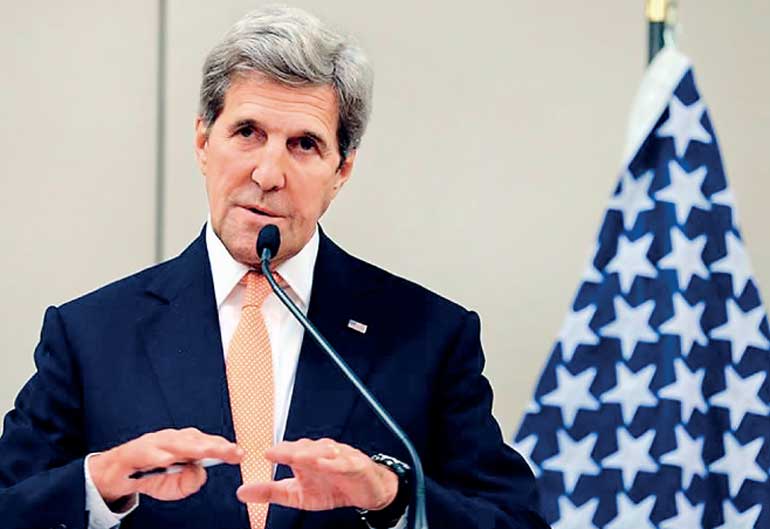Sunday Feb 22, 2026
Sunday Feb 22, 2026
Tuesday, 30 August 2016 00:03 - - {{hitsCtrl.values.hits}}
Reuters (Dhaka): The United States believes that elements of Islamic State are “connected” to operatives in Bangladesh, Secretary of State John Kerry said on Monday, promising help with intelligence and law enforcement after a wave of militant attacks.
Kerry’s blunt statement followed the 1 July attack on a cafe in an upscale district of the Bangladeshi capital, Dhaka, in which 22 people were killed - mostly non-Muslims and foreigners, including one American.
It directly contradicted the narrative of Prime Minister Sheikh Hasina’s Government, which has blamed homegrown militants and denied a foreign hand in the hostage taking at the Holey Artisan Bakery that was claimed by Islamic State.
The cafe raid was the most shocking of a series of atrocities that has included killings of atheist intellectuals, people from religious and sexual minorities and foreigners, raising fears over the stability of the mainly Muslim nation of 160 million.
Responding to questions after giving a speech, Kerry said he had a “very candid” conversation with Hasina.
He said that Islamic State had wide contacts around the world, including in South Asia, adding: “They are connected to some degree with some of the operatives here, and we made that very clear in our conversations.”
As Kerry’s motorcade headed to the US embassy for meetings with opposition leaders, a Government minister directly contradicted him.
“I told him that there is no such terrorist or militants from outside or who are connected with the (Islamic State), but there are militants inside our country and they are homegrown,” Home Minister Asaduzzaman Khan told Reuters.
Bangladesh’s secular Government has continued to enjoy the West’s support despite mounting concerns over its handling of the escalation in militant activity.
 John Kerry
John Kerry
Bangladesh’s security response has, say analysts, been colored by a political standoff with the Islamist-leaning opposition that boycotted the last general election and is suspected by the Government of links to local militant groups.
Police believe that Jamaat-ul-Mujahideen Bangladesh, a local militant group that has pledged allegiance to Islamic State, was involved in organising in the cafe attack.
Two days before Kerry’s visit, security forces said they had killed three militants, including a Bangladeshi-born Canadian citizen called Tamim Ahmed Chowdhury who was suspected of being the mastermind.
Chowdhury is reported to have been the subject of a profile in an Islamic State journal called Dabiq that identified him as its top operative in Bangladesh. The Syria-based militant group also published “selfie” photos of the cafe attackers on its propaganda channels while the hostage crisis was continuing.
Kerry said “there is much we can do to cooperate” in the fields of intelligence and law enforcement to address security threats from both domestic and trans-national organisations.
“That’s the nature of the beast that we are dealing with today,” Kerry said. “I’m absolutely confident that we will build additional capacity and it will be effective.”
In a speech, Kerry also touched on the need to uphold democratic principles “to defeat terrorists” and expressed concern over upholding the rights of workers.
Bangladesh’s economy depends heavily on the fortunes of the $ 28 billion garment industry, which is struggling to improve a poor safety record epitomized by the Rana Plaza disaster of 2013 in which a factory collapse killed more than 1,100 people.
Kerry was making his first visit to Bangladesh. His armored SUV hit a gate in front of the US embassy, but he was not hurt.